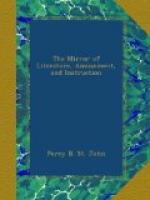Derby Silk Trade.
Silk throwing is a considerable trade in Derby. Sir Thomas Lombe’s famous machinery has not, however, been used for some years, but improved machinery, which performs twice the work, in less room, is now adopted. The chief throwsters are Messrs. Bridget, Taylor, Adcock, Butterworth, Moore and Gibson, Devenport and Forster. The silks, as imported, chiefly from Bengal and China, are in what are called books of 10 lb. of which ten form a bale, and the business of the throwster is to wind it, from the plats or skeins upon bobbins; and from these, it is twisted into two, three, or more threads. The price for throwing is from 1s. 9d. to 2s. for Bengals, and from 2s. 9d. to 3s. per lb. for China. About 1,500 lbs. a week are thrown, employing from 1,000 to 1,200 men, women, and children. The price used to be 4s. a lb. but a fall has taken place, within the last fifteen years, in this article of labour, as well as in every other.
I heard much from all the manufacturers of Derby, of the mechanical ingenuity of Mr. James Fox, of Chester Road, on the banks of the Derwent. I paid him a visit, and beheld his powerful iron lathes, twenty-four feet long, used by machine makers for planing iron. Here I saw iron cut in groves or squared with great simplicity, by duly adjusting the velocity so as to generate no heat, for a velocity, which generates heat, destroys the tool. These lathes, Mr. Fox makes for machinists in all parts of the kingdom, and gets from L200. to L700. for them. The castings are made at Morley Park; and I was sorry to learn that they are now delivered at L7. a ton instead of L30. the usual and legitimate price. In truth, the depression of the iron trade is as great or greater than that of the other staples of the kingdom.
The number of cotton frames employed by the above, is from 3,000 to 4,000 dispersed over the town and country; and the number of silk frames is about 1,000. The average earnings of the cotton hands are from 7s. to 10s. per week, but many frames are worked by young persons both male and female. The silk hands earn about 12s. or 15s.
Petrifaction Manufactory.
A manufactory, at once local and elegant, exists at Derby, which excites the attention and loosens the purse-strings of most strangers. It is the spar-manufactory of Mr. Hall, and in it, he converts the petrified sports of nature, in the Derbyshire hills, into the luxuries of civil life. Those in London, who desire to see the products of these works, may behold them at Mawe’s, in the Strand; but all, who visit Derby, will not fail to call upon Mr. Hall, who is as courteous as he is ingenious. Amythistine and other spars, white and variegated marble, alabaster, &c. are here formed in a series of workshops, aided by a steam engine, into vases, columns, obelisks, &c. &c. Tasteful statuaries are also employed, in converting the same materials into dogs, horses, sheep, cows, &c. for chimney ornaments; and Mr. Hall has likewise imitated the best vases, and some of the structures of Egypt, with exact transcripts of their inscriptions. In these works, in polishing, sawing, fashioning, &c. he employs numerous hands; and persons, whom he may indulge, with a view of the details, will be instructed and gratified.




